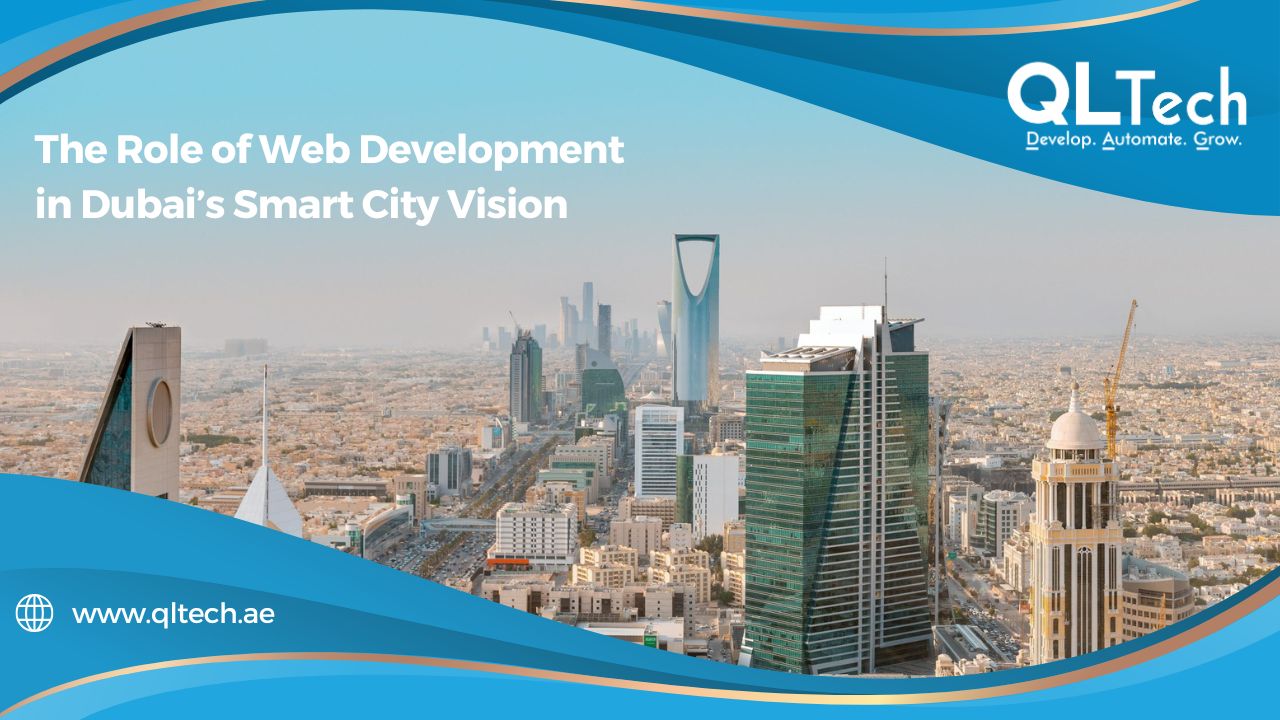Dubai has always been in the position of innovation and competing to be one of the world’s leading smart cities through embracing technologies and sustainability. Central to the vision, integration of advanced digital infrastructure and data-driven services stand to improve the quality of life of the residents as well as make the city efficient. Digital development is a necessary tool in all of this by developing online platforms that help to support smart city initiatives, allow for smooth communication, and encourage engagement with government services. This piece delves into how web development supports Dubai’s smart city aspirations and what that entails in terms of the future of urban life.

1. Ease of access to e-government services
One of the most substantial pillars of Dubai’s smart city vision is the integration of online government services to make accessibility and effectiveness simple. Web development is at the heart, for government websites and applications are designed to simplify services, paperless, and more accessible. Users can pay for utility bills or renew their licenses anytime and anywhere using responsive design.
-
- Example: In Dubai, for example, the government portal offers an integrated site from which residents can access any service required from healthcare to transport.
- Impact: Thus, by web development, interaction with the public becomes very convenient, and services are very accessible, which ultimately enhances citizen satisfaction and eliminates redundant workloads in administration.
2. Enabling Real-Time Communication and Citizen Engagement
- A smart city thrives in participative citizenship and communication. Dubai develops innovative web development which builds forums to accommodate real-time applications between the residents and the local authorities. Whether reporting incidents, requesting maintenance, or just providing feedback, web development enables such incidents to be carried out with ease.
- Dubai Municipality’s platforms provide avenues whereby residents can report issues, monitor updates, and participate in the development of the city.
- Impact: In this, real-time feedback loops work towards establishing transparency and trust among citizens in involving themselves in urban governance.
3. Advancements in Smart Infrastructure through IoT Integration
- Internet of Things: It is the backbone of any smart city. Dubai has highly invested in IoT-enabling infrastructure. Under web development, it provides user-friendly interfaces and data dashboards that help monitor, regulate, and interact with these IoT systems, such as applications for smart traffic management, energy monitoring, and waste management.
- For instance, Dubai’s smart traffic management system employs real-time monitoring of traffic flow through the regulation of web-enabled dashboards that reduce congestion.
- Impact: Ultimately, therefore, web-enabled IoT usage in cities like Dubai optimizes city operations, enhancing efficiency and sustainability without compromising quality of life for residents.
4. Advocating Sustainable and Eco-Friendly Practices
One of the core building blocks of Dubai’s smart city of the future is sustainability. In web development, best practices focused on tracking and promoting sustainable activities and initiatives would include energy-saving practices, waste reduction programs, and more. This kind of green web development to reduce carbon footprint would be code optimization and choosing energy-efficient servers.
- Example: There are online portals and apps that monitor energy and water consumption. There is communication about consumption and hints on how to avoid more harm to the environment.
- Impact: Through web development, Dubai can publicize its effort and enable citizens to make eco-friendly choices that contribute to a clean, green city.
5. Enhancing security and Data Privacy
Security and data privacy are one of the primary concerns of a digital-first city. The web development is almost a must in the smart city initiative proposed by Dubai as it demands huge volumes of access to data and facilitates holistic security and data privacy. Advanced web security measures, combined with the integration of blockchain solutions, are used in order to hide sensitive data so that all digital interactions become safe and trustworthy.
- Example: Dubai is researching blockchain solutions for handling data securely, to ensure that personal information is not divulged.
- Impact: The integration of the hard security practice into web development in Dubai gives a sense of security to residents when they share the data and seek online services.
6. Leverage Data Analytics to Support Informed Decision Making.
Data indeed becomes an asset in a smart city, providing insight for intelligent decision-making. This is where web development comes in – essential as part of creating data dashboards and visualization tools that help city officials and citizens understand complex data. Through data visualization, web platforms make Dubai empowered enough to strategically make decisions in critical areas related to traffic management, resource allocation, and so forth in urban planning.
- Example: Dubai’s data-driven platforms allow monitoring of real-time metrics of the city, from air quality to water usage, to inform adjustments in policy and operations.
- Impact: Data-centric web development will enable Dubai to tap into analytics for proactive city management to make its urban systems more adaptive and responsive.
7. Business Innovation and Digital Transformation
Dubai’s smart city vision does not just manifest in governmental change but also through innovation within the private sector. Web development enables companies to contribute to the ultimate goal of smart city initiatives by providing digital experiences to show their passion for technology and efficiency-from smart retail experience to digital banking companies are using web development to innovate and help realize Dubai’s position as one of the world’s top business destinations.
- For instance, retailers in Dubai upgrade their online portals with AI-based features that enable seamless shopping experiences and closely align with the goals of a smart city.
- Impact: A future-proofed digital framework equips businesses to embrace cutting-edge practices that makes Dubai a hotbed of attraction and an innovation-friendly place.
Conclusion: Development of the Web: the Pillar of Dubai’s Future Smart City
As the city sets a pace for becoming smarter, web development has been the foundation that has steered this novel transformation. To the readers, introducing accessible e-government services, IoT integration, sustainability-focused platforms, and highly secure digital ecosystems- web development is ushering in a new era of urban life in Dubai. Moving forward to become more innovative, the web development community of Dubai will definitely spearhead to set up a sustainable, connected, and smart city that would serve as the prototype for all future smart cities.


